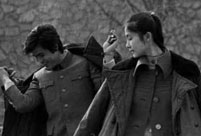NANCHANG, Dec. 17 -- Five out of six government vehicles will be auctioned off, and civil servants will have to budget car use, Xinyu City in east China's Jiangxi Province announced on Tuesday.
The move is one more step forward in the crackdown on inappropriate use of government vehicles and the resulting waste of public funds.
The remaining one-sixth of government vehicles -- about 130 cars -- will be managed and supervised collectively by a public vehicle service center, according to the new regulations which go into effect on Jan. 1.
According to the city, estimated administrative costs of up to 15 million yuan (2.47 million U.S. dollars) will be saved each year.
Public servants will receive a transportation card for car use with limited credit based on their rank. When the credit runs out, they will have to take a bus or taxi, at their own expenses.
Car use will be policed across the whole authority to ensure vehicles are available for law enforcement, confidential communication, emergency services, special and technical needs, said Hu Yongliang, of the city' s discipline inspection commission. The vehicle auction will go to auction agencies that can stand up to supervision by the public, media and discipline authorities.
Courts, procuratorates, public security bureaus, schools, hospitals and some other administrative bodies are temporarily excluded from the reform, but labels and GPS monitoring will monitor any illicit private use, Hu said.
"The regulations are more stringent than the requirements of central authorities, and more innovative compared with other cities," said Fu Shuizhu, deputy head of vehicle reform.
PUBLIC ENEMY
Official vehicles are one of the "three guzzlers" of public funds (the other two being overseas trips and receptions) that are most likely to offend the public.
Last December, the new leadership issued a package of rules specifically attacking misuse of official vehicles.
In November, the central government standardized fund management and banned Party and government extravagance, specifically identifying management of official vehicles as a defining problem. Those who violate the rules could have their behavior exposed to the public, be demoted or even fired.
In November, the Communist Party of China (CPC) disciplinary watchdog cited 4,851 cases of private use of government cars by officials, about one-third of all violations of the frugality rules.
Plenty of government officials treat official cars as if they were their own and use them to send children to school, go shopping or for long distance travel.
"I never had to worry about gas or expressway tolls going home in an official car at weekends," said a deputy county head in central China who works some 300 km away from his hometown, "but the good old days are gone."
China may have over two million government cars, according to Ye Qing, vice director of the Hubei Statistics Bureau in central China. It is hard for discipline officials to monitor the use of every car, Ye said.
NATIONAL MOVEMENT
Less stringent, but still effective, moves have been implemented in other cities.
Yongsheng County of Lijiang City in southwest China's Yunnan Province labels "name cards" on government cars, meaning the public can easily identify them and report misuse. The practice is shared by the government of Sihong County in east China's Jiangsu Province.
In south China's Guangzhou, GPS technology and a user identification system were adopted two years ago, which the discipline commission estimates saved 40 million yuan in a single year.
The 400 government vehicles in Qitai County of northwest China's Xinjiang Uygur Autonomous Region are monitored 24 hours a day via GPS.
"It is an irresistible trend for local governments to demolish general use of official cars. With a significant decrease in government cars, related discipline violation will naturally diminish," said Wu Zhongmin, a professor of sociology at the Party School of the Central Committee of the CPC.
 Heavy cargo flights taking off
Heavy cargo flights taking off In pictures: PLA's digital equipment
In pictures: PLA's digital equipment  Americans mark Thanksgiving Day with parades
Americans mark Thanksgiving Day with parades Love searching stories in cities
Love searching stories in cities  Shanghai shrouded in heavy fog
Shanghai shrouded in heavy fog Office ladies receive ‘devil’ training in mud
Office ladies receive ‘devil’ training in mud Changes in Chinese dancing culture
Changes in Chinese dancing culture  Highlight of Mr Bodybuilding and Miss Bikini Contest
Highlight of Mr Bodybuilding and Miss Bikini Contest  Picturesque scenery of Huanglong, NW China
Picturesque scenery of Huanglong, NW China 17th joint patrol of Mekong River to start
17th joint patrol of Mekong River to start The islands where immortals lived
The islands where immortals lived Snowstorms cause chaos for travelers
Snowstorms cause chaos for travelers Special police detachment of Hefei
Special police detachment of Hefei  Weekly Sports Photos
Weekly Sports Photos China's moon rover, lander
China's moon rover, landerDay|Week|Month